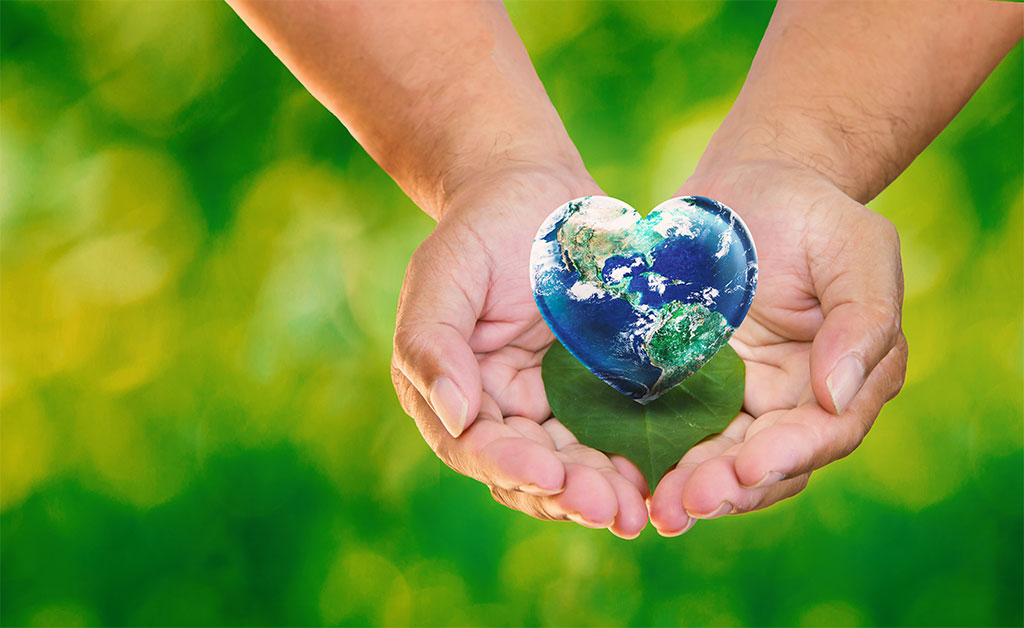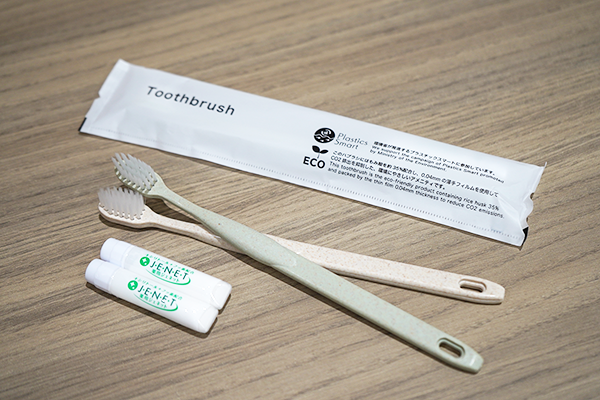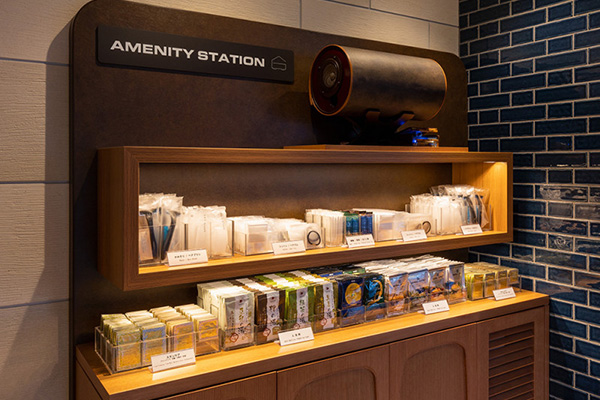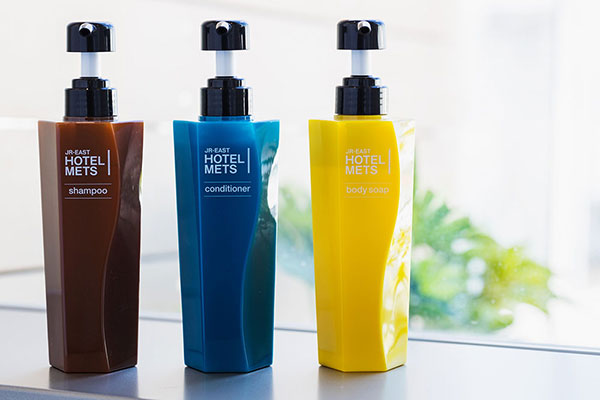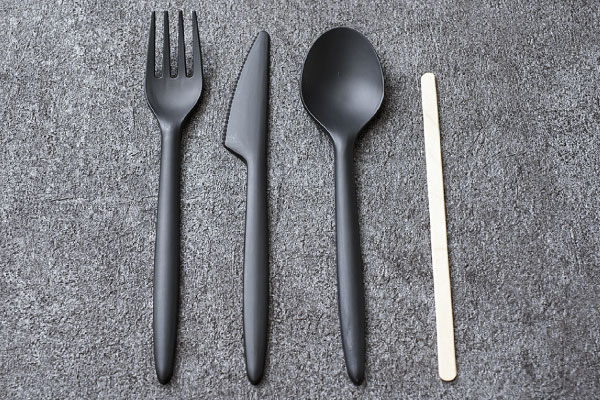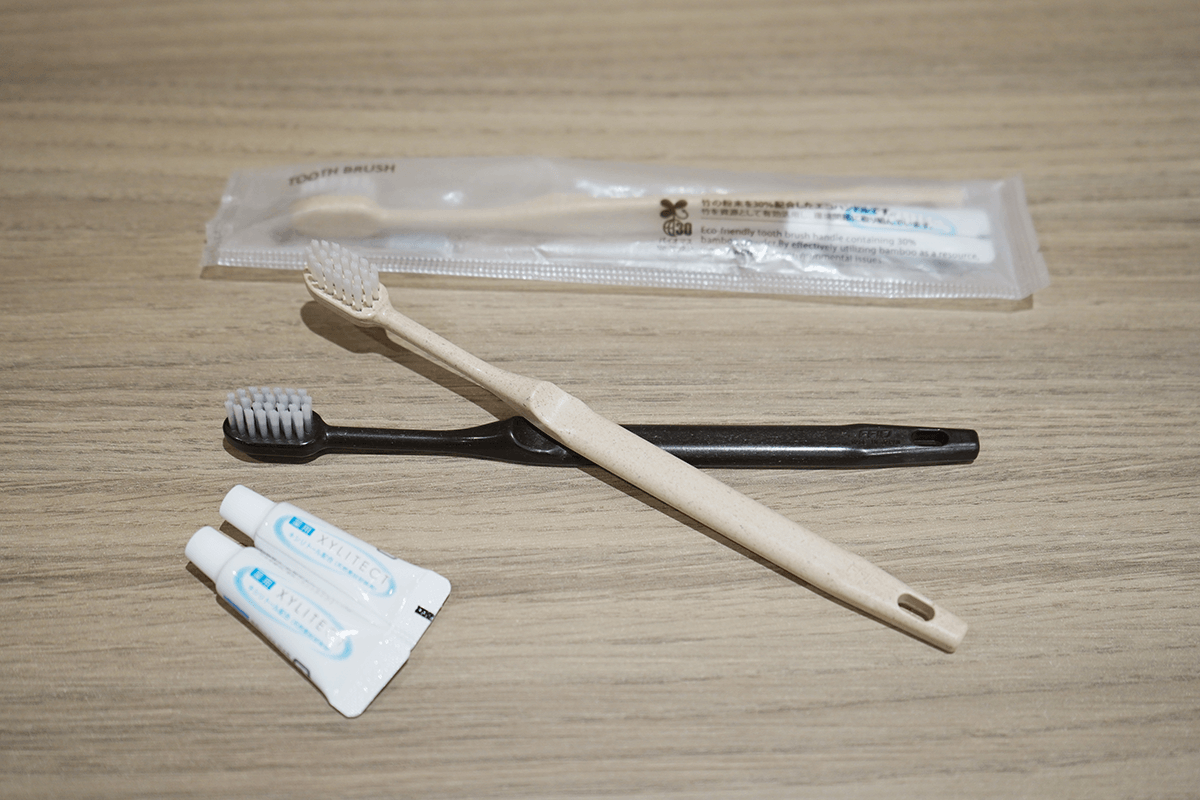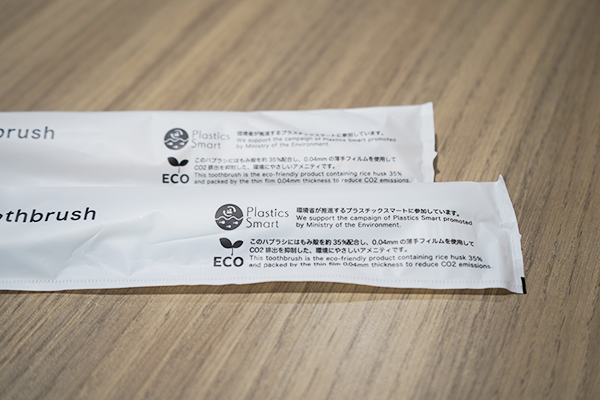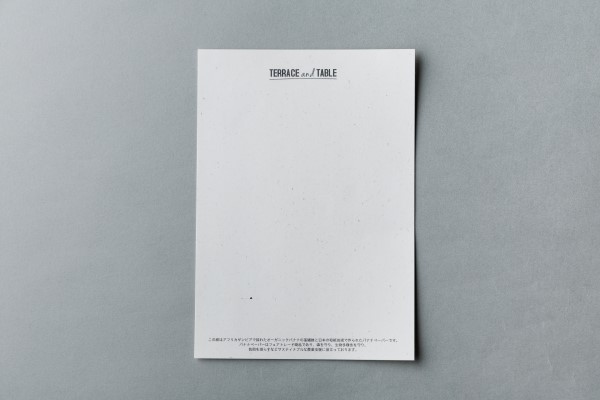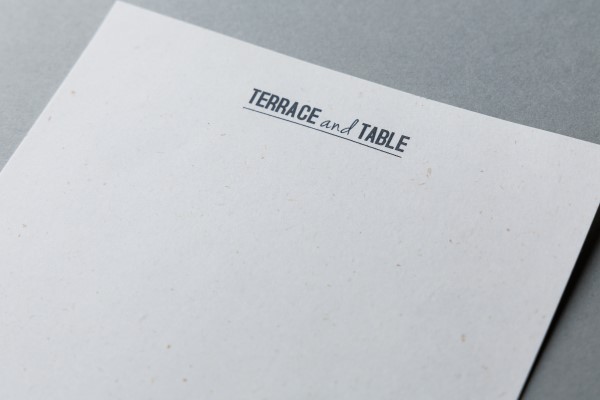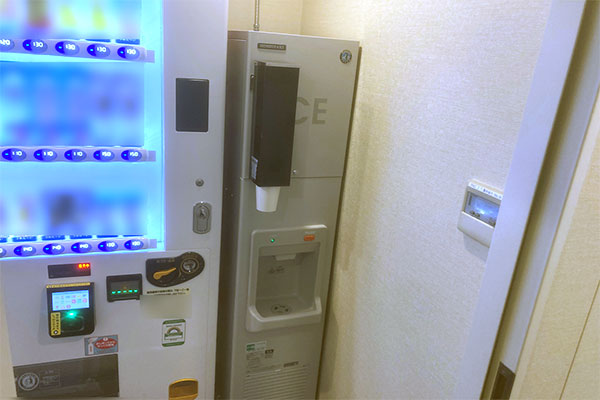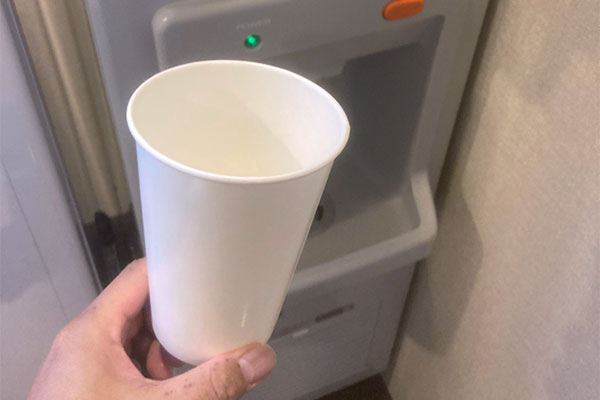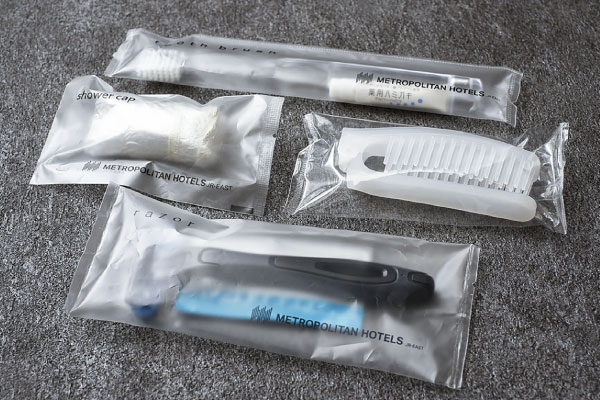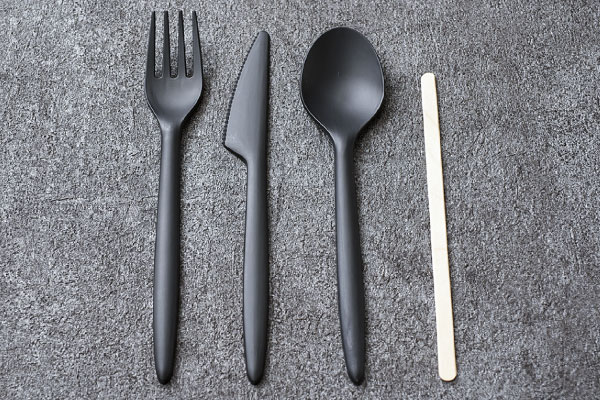Environmental Activities Initiatives
To date, our company has been working to reduce energy consumption by switching to LEDs, converting equipment to inverters, and using BEMS to improve operations. We have also been working to save water by using recycled water, water-saving faucets, and water-saving showerheads, to reduce waste by enabling the methanation recycling of kitchen waste, and to reduce one-way plastics by using biomass products.
In addition to our efforts to date, we are working to realize a decarbonized society and a resource-recycling society through various environmental impact reduction activities.
- SDGs at The Tokyo Station Hotel Initiatives to Realize a Sustainable World
- We are gradually replacing toothbrushes in guest rooms with environmentally friendly products
- Linen reuse cards switched to wood made from cedar of Miyazaki Prefecture origin
- Linen reuse cards switched to wood made from cedar of Miyazaki Prefecture origin
- "CO2 Zero STAY" introduced in all rooms
- Introduction of Amenity Stations
- Adoption of pump-type refillable bottles for guest room toiletries
- Recycling used soap to improve the sanitary environment
- Discontinue use of plastic straws, adoption of alternatives
- Replacement of plastic shopping bags at directly operated bakery stores with 30% biomass plastic shopping bags
- Plastic cups for ice makers are replaced with paper cups
- Eight products using specified plastics have been replaced with alternative materials or discontinued
- Changed food waste treatment to methanation recycling
- Efforts to save and reuse water
- Introduction of BEMS
- Promoting the use of LEDs
- Adoption of JR’s own electric power
- Efforts to realize a decarbonized society
- Efforts to realize a resource-recycling society
SDGs at The Tokyo Station Hotel Initiatives to Realize a Sustainable World
At The Tokyo Station Hotel, we are actively taking action aimed at the 17 Sustainable Development Goals (SDGs), which we are doing through the undertaking of initiatives such as the “CO2 Zero STAY” program, (which virtually eliminates CO2 emissions generated during a stay) and the horizontal recycling of plastic lids. We are committed to continuing with further concrete efforts aimed at realizing a sustainable world.
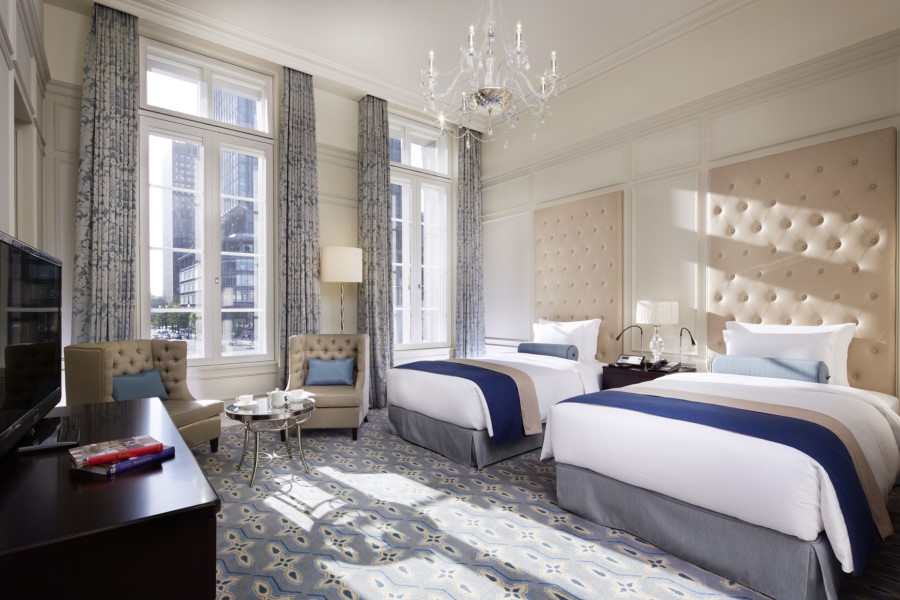
CO2 Zero STAY
The Tokyo Station Hotel’s CO2 Zero STAY carbon offset program has been in place since June 2023. It calculates and visualizes the CO₂ emissions generated during a guest’s stay and offsets them by investing in initiatives such as the installation of energy-saving equipment, the expansion of renewable energy, and forest conservation.
From the start of the program in June 2023 to the end of May 2025, emissions totaled approximately 1,355 tons, and we have invested in equivalent emission reduction activities. Unlike plans where the offsetting cost is included in the room price, this unique initiative is fully funded by the hotel.
As of April 2024, the program is automatically applied to all stays, regardless of the booking channel. Simply by staying at The Tokyo Station Hotel, guests are contributing to the fight against global warming.
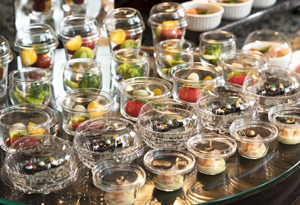
Horizontal Recycling of Plastic Lids
The plastic lids used for individual portions of menu items served during the buffet breakfast at The Atrium are individually collected and recycled to be used as the same product as part of a horizontal recycling process. During the period from October 2022 to the end of February 2024, 476 kilograms worth of these lids were collected and recycled for use as plastic lids once again.
Adoption of “mado” Glass: Dishes Made Using Disused Automobile Window Glass
Tumblers from the “mado” series are found in the powder rooms of guest rooms. The “mado” series features glass dishes that are made by Ryukyu glass artisans using shattered window glass that has been recovered from disused vehicles. All 150 rooms will see replacement with this series taking place in order starting in April 2024.
Zero CO₂ MICE
C CO2 Zero STAY
April 2024 (from June 2023 for reservations made through the hotel’s website): Carbon offsetting has been undertaken for CO2 emissions generated during hotel stays with contributions being made to renewable energy, forest protection, and energy conservation. Applies to all booking channels.
Zero CO₂ MICE
2022: Proposed sustainable events that offset the amount of CO2 generated by electricity used in events and conferences through renewable energy.
Introduction of BEMS (Building Energy Management System)
October 2012: Visualization of daily energy use takes place to go about optimizing indoor environments and energy performance.
Air Conditioning Equipment
2014: Reduced power consumption by changing the frequencies of air conditioner inverters, automatically controlling air conditioner startup and shutdown based on temperature and humidity, and changing the outdoor air damper openings of air conditioners.
Saving Energy With LEDs
2014: Promoted the use of LED lights and thinned out lightbulbs in the work area. 58% of lighting has been replaced with LEDs. We aim to achieve an LED adoption rate of 100% at all back offices, banquet halls, and guest rooms by the end of FY2027. Existing LED lighting will be replaced with lower wattage lighting within around 10 years of installation.
Reduction of CO2
2014: When it comes to the hotel’s track record in terms of specified greenhouse gas emissions, progress has been made with efforts resulting in a 13.3% rate of reduction in 2023 when compared to the base year of 2013.
Plastic Product Waste Reduction / Waste / Water-Saving Measures
Garbage Reduction for Plastic Products
July 2022: The materials used for eco cards (linen reuse cards) and cleaning-in-progress cards were changed from plastic material to wood material consisting of mill ends. Contribution to the Effective Utilization of Mill Ends
October 2022: Started collecting the plastic lids used for individual portions of menu items served during the buffet breakfast at The Atrium and recycling them to reproduce the same product as part of a horizontal recycling process.
August 2023: Set up separate garbage bins in guest rooms for combustible garbage and recycling.
March 2024: Changed over to toothbrushes bearing the ECO mark (meaning they are comprised 35% of rice husks).
Adoption of Environmentally Friendly Materials
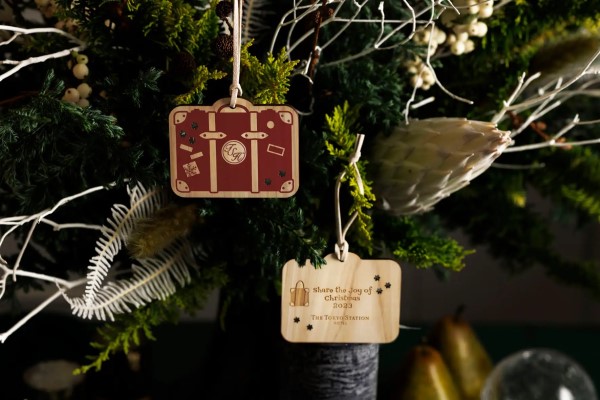
Utilization of Mill Ends
December 2025: Sale of Christmas charity ornaments and donation of all proceeds to “more trees” (a forest conservation organization).
December 2021: Produced coasters using wood mill ends left over during the furniture manufacturing process. Utilized at Oak.
April 2024: Cups found in guestroom powder rooms were switched out for glasses made with disused automobile window glass.
We are gradually replacing toothbrushes in guest rooms with environmentally friendly products
In response to The Plastic Resource Circulation Act which came into effect in April 2022, we are gradually replacing toothbrushes in guest rooms with products made from environment-friendly plant-based biomass.
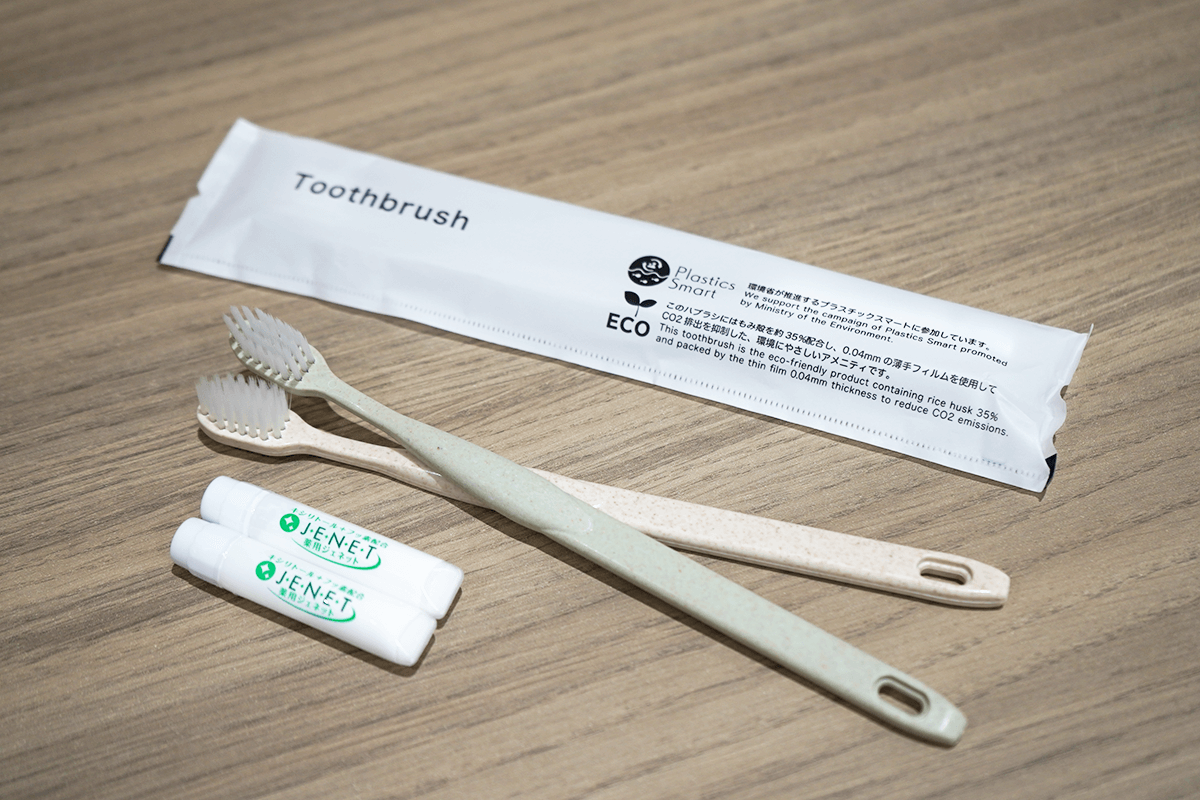
Image of the toothbrushes found in guest rooms
Linen reuse cards switched to wood made from cedar of Miyazaki Prefecture origin
Hotel Metropolitan Kawasaki is certified as a Kawasaki SDGs Gold Partner, and as part of our sustainable activities, we ask guests staying for consecutive nights to allow their beds to be made with the same linen as the first night instead of having them changed.
We have also switched from plastic to wooden linen reuse cards, which are used to confirm the intentions of guests.
The wood for the cards was chosen due to Kawasaki’s administrative partnership with Miyazaki Prefecture, as well as the fact that cedar from Miyazaki is water and rot resistant, which satisfies the requirements for long-term use.
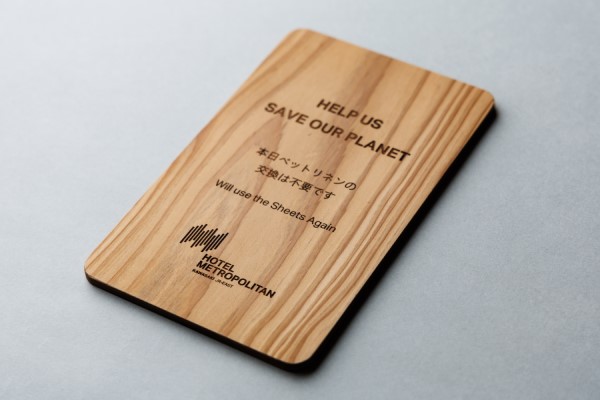
Linen reuse card
Banana paper used for presentation menu paper
Hotel Metropolitan Kawasaki’s “Terrace and Table” uses banana paper for presentation menu paper. Banana paper is a fair trade product made by combining organic banana stems fiber harvested in Zambia, Africa and “washi” Japanese paper technology.
Use of the paper helps support sustainable agriculture by preserving forests and biodiversity, and reducing poverty.
"CO2 Zero STAY" introduced in all rooms
The Tokyo Station Hotel will apply the "CO2 Zero STAY" program, which virtually eliminates CO2 emissions generated during a stay, to all rooms booked through the official website from June 1, 2023. By using the carbon offset system, the amount of CO2 emissions generated by your stay will be reduced to "practically zero."
Just by staying at our hotel, guests are supporting activities such as forest conservation and the expansion of renewable energy, and will be able to enjoy a sustainable stay.
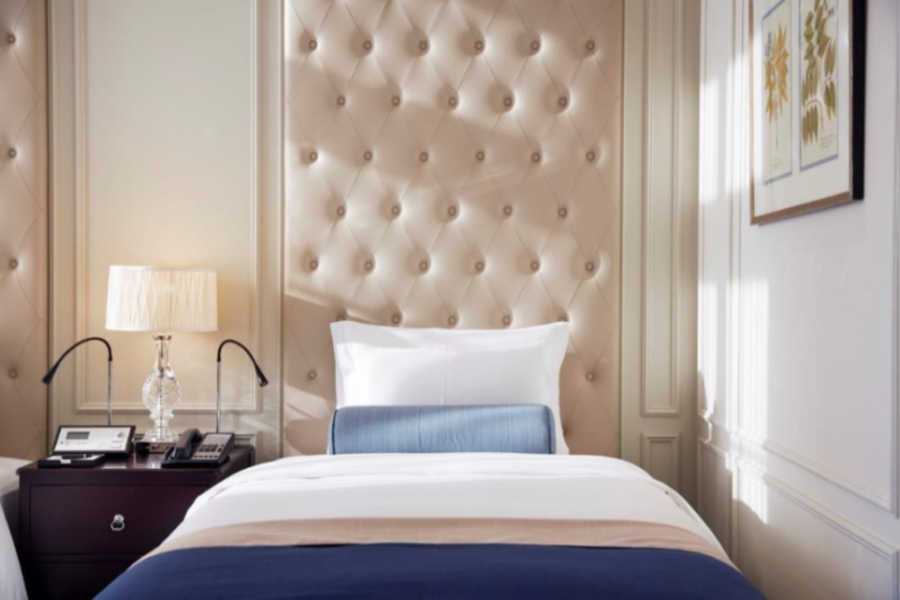
The Tokyo Station Hotel Guest room
Introduction of Amenity Stations
Since 2017, we have introduced “Amenity Stations” at JR-East Hotel Mets (all hotels operated by Nippon Hotel Co., Ltd.). In an effort to cooperate in reducing disposable plastic and waste, we prepare the minimum amenities in the guest rooms, and set up “Amenity Stations” in our hotel lobbies for customers to pick up only the necessary amenities as self-service style.
Currently, 27 hotels, including Hotel Dream Gate Maihama and Hotel Dream Gate Maihama Annex, have Amenity Stations.
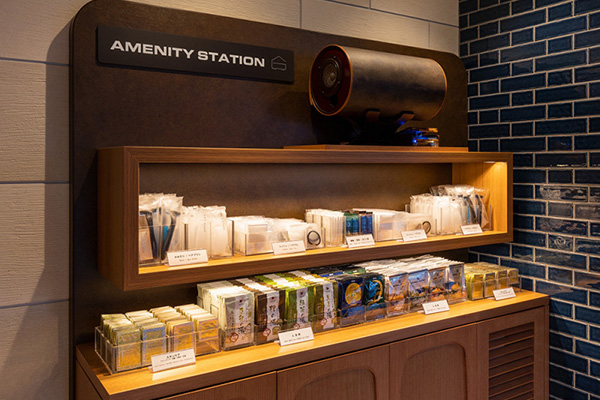
Amenity Station
Adoption of pump-type refillable bottles for guest room toiletries
Regarding bath amenities in guest rooms, as part of our efforts to reduce single-use plastics, JR-East Hotel Mets has sequentially switched to pump-type refillable bottles, and currently all hotels operated by Nippon Hotel Co., Ltd., except for The Tokyo Station Hotel, use refillable bottles.
We are also working to reduce the use of plastic by using glass refillable bottles at mesm Tokyo, Autograph Collection.
-
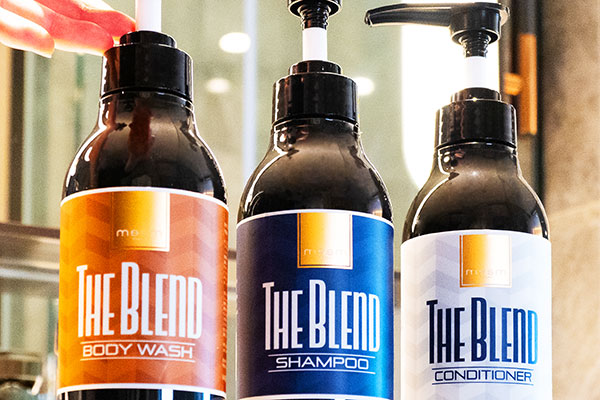 Mesm Tokyo, Autograph Collection pump bottles
Mesm Tokyo, Autograph Collection pump bottles
-
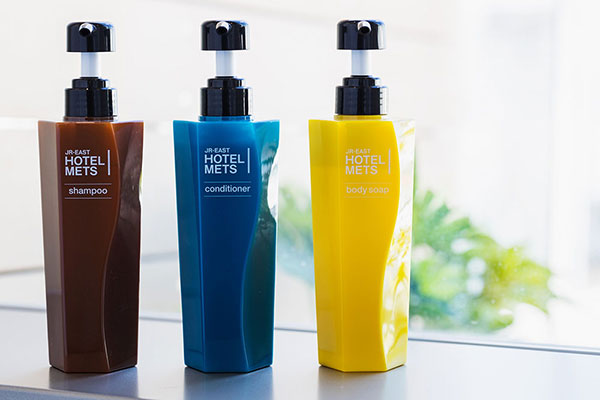 JR-East Hotel Mets pump-type bottles
JR-East Hotel Mets pump-type bottles
Recycling used soap to improve the sanitary environment
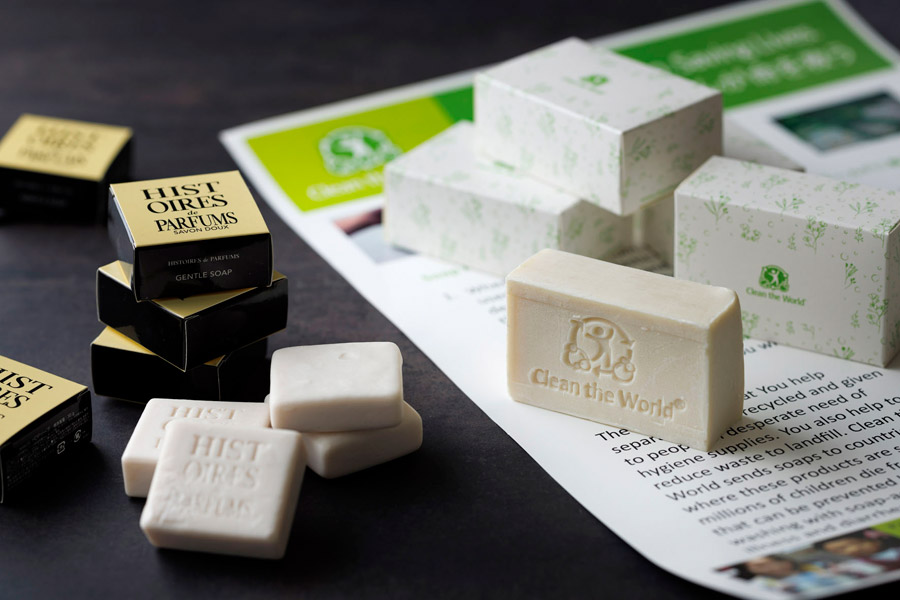
The Tokyo Station Hotel is participating in the Clean the World® program, which collects and recycles used soap from guest rooms. Recycled soaps and sanitary products will be donated to people suffering from diseases caused by public health emergencies, and to areas affected by disasters and conflicts, and will be used to improve the sanitary environment. In addition, we aim to create a recycling-oriented society by reusing soap, which had to be discarded until now.
Discontinue use of plastic straws, adoption of alternatives
In an effort to reduce the use of disposable plastic, by March 2020, all hotels operated by Nippon Hotel Co., Ltd. had switched to paper or biodegradable plastic straws for the plastic straws used in banquet halls and directly-managed restaurants (approximately 440,000 straws in FY 2018), or had stopped using plastic straws.
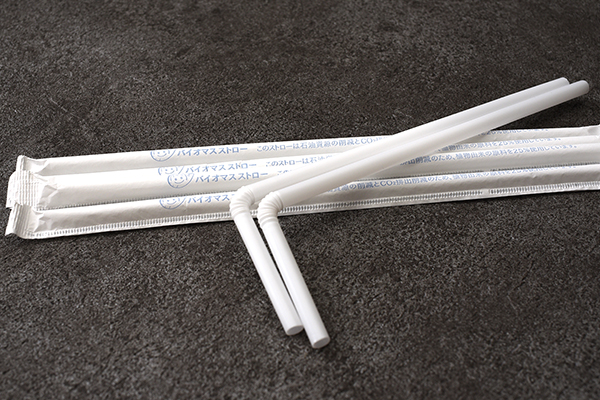
Replacement of plastic shopping bags at directly operated bakery stores with 30% biomass plastic shopping bags
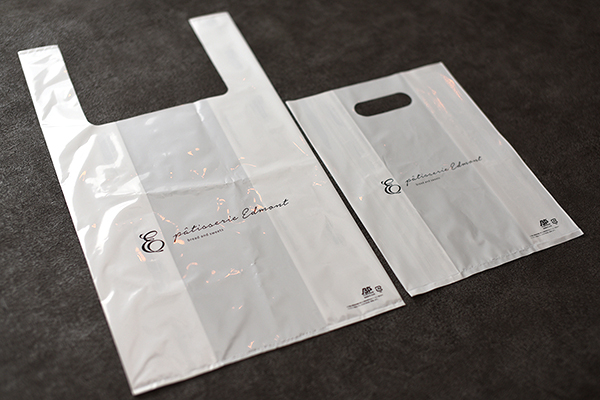
By March 2020, we had replaced plastic shopping bags (approximately 75,000 used in FY 2018), which were used in the bakery shops directly operated by Hotel Metropolitan and Hotel Metropolitan Edmont, with 30% biomass.
Plastic cups for ice makers are replaced with paper cups
At hotels such as JR-East Hotel Mets and The Tokyo Station Hotel, we are working to reduce one-way plastic consumption by switching from plastic to paper cups for ice machines used by guests.
Eight products using specified plastics have been replaced with alternative materials or discontinued
In accordance with the “Plastic Resource Recycling Promotion Law” that came into effect in April 2022, all hotels operated by Nippon Hotel Co., Ltd. have abolished “combs” and switched to biomass plastic for “hairbrushes, razors, shower caps, stirrers, forks, spoons, and knives” among products using specified plastics by March 2022.
Changed food waste treatment to methanation recycling
At seven hotels with banquet halls and directly managed restaurants, we are striving to improve the recycling rate by switching food waste treatment to methanation recycling.
According to the periodic report under the Act on Promotion of Recycling and Related Activities for Treatment of Cyclical Food Resources, the recycling rate of food waste at Nippon Hotel Co., Ltd. in FY 2016 was approximately 47%, but in FY 2024 the recycling rate increased to approximately 98%.
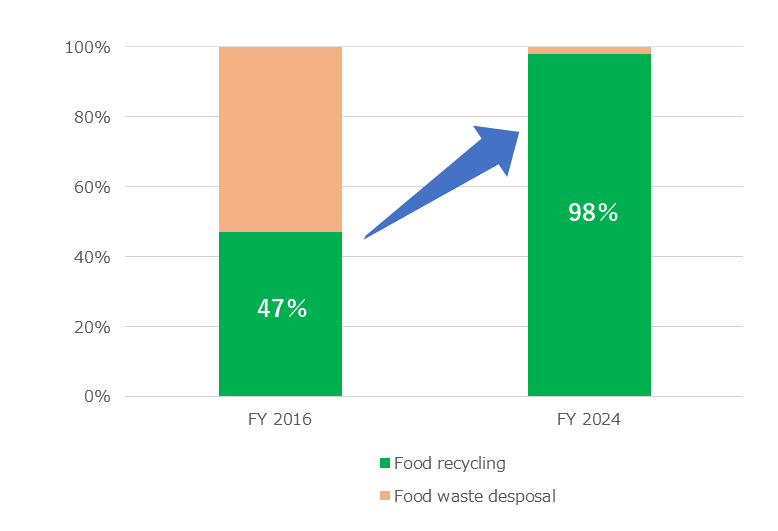
Efforts to save and reuse water
When a new hotel is built or when the facilities of an existing hotel are upgraded, we work to conserve water by using water-saving shower heads and toilets in the guest rooms, and by installing water-saving faucets and foaming faucets in the restaurant kitchen.
In addition, some hotels have installed water recycling equipment that recycles kitchen waste water and rainwater from restaurants and banquet halls, thereby reducing the use of tap water by approximately 63 tons per year (as of FY 2024).
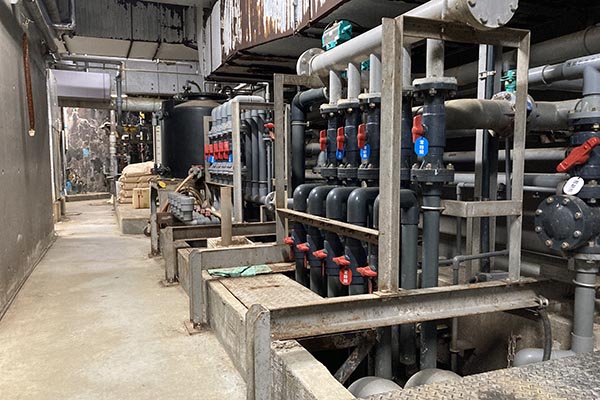
Introduction of BEMS
BEMS stands for “Building Energy Management System” and is a system aiming at optimum energy management for energy consumed in buildings.
Data on energy consumption is accumulated and analyzed using ICT, enabling efficient energy use while achieving a comfortable hotel environment.
Some hotels operated by Nippon Hotel Co., Ltd. have introduced BEMS, and by visualizing energy consumption, each department considers power saving and energy saving measures, and applies them to reduce energy consumption by implementing appropriate and efficient equipment operation and equipment repairs.
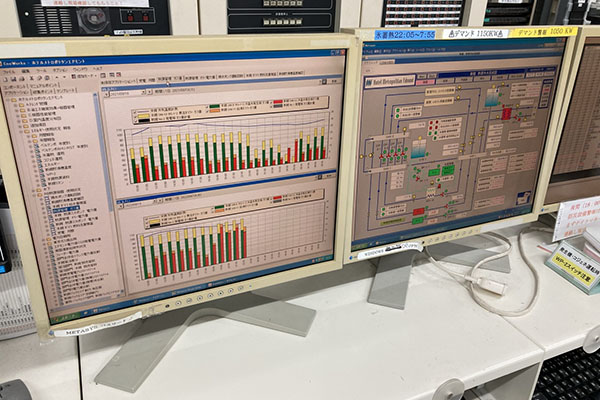
Use of inverters for various equipment
An inverter is a device that controls voltage, current, and frequency. For air conditioning and ventilation equipment and pumps, we are working to reduce energy consumption by using inverter-equipped equipment to enable detailed control of equipment operation at the time of hotel construction or facility renewal.
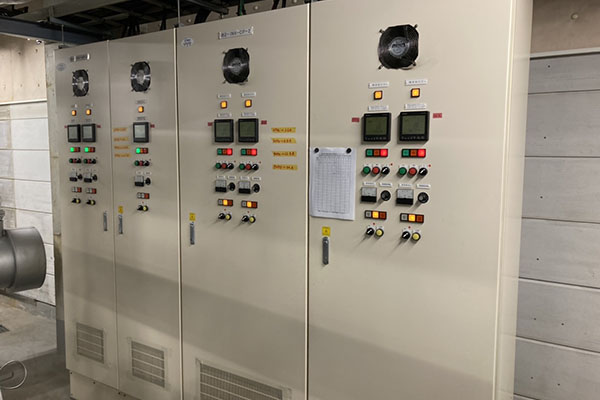
Promoting the use of LEDs
We are actively promoting the use of LED lights when building new hotels or updating facilities. The ratio of LED lighting in all hotels in operation increased from 54% in FY 2016 to 86% in FY 2024, and approximately 132,000 LED lights were newly installed in 8years.
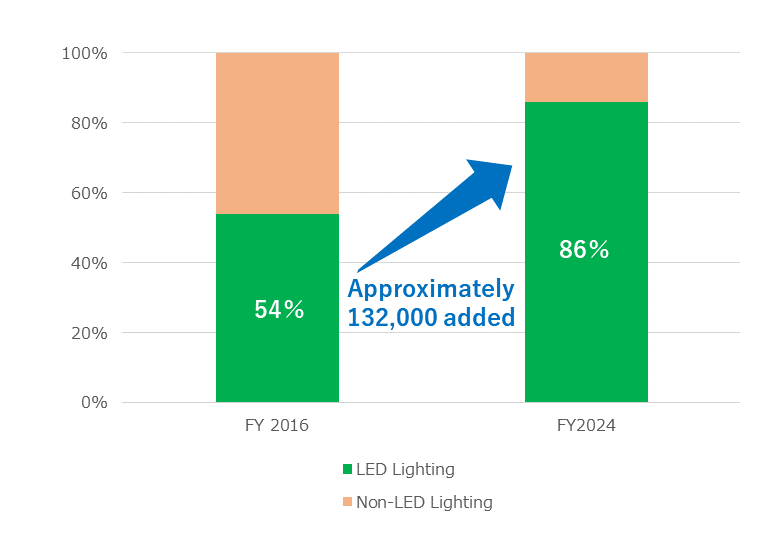
Adoption of JR’s own electric power
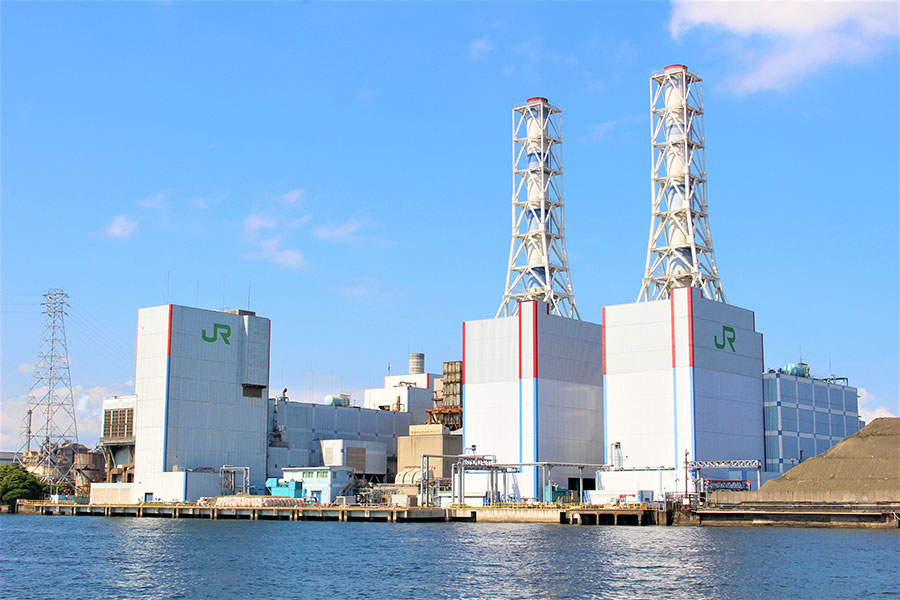
Seventeen of the hotels we operate use JR’s own electric power (adjusted emission factor for FY 2023: 0.310 kg-CO2/kWh) with low CO2 emissions and low environmental impact.
*Reference: TEPCO Energy Partner FY 2023 emission factor: 0.431 kg-CO2/kWh
Efforts to realize a decarbonized society
The entire JR East Group is working to achieve the “Zero-Carbon Challenge 2050,” with the goal of “reducing CO2 emissions by 1% every year (five-year average CO2 emission factor)” and “achieving net-zero CO2 emissions in FY 2050.”
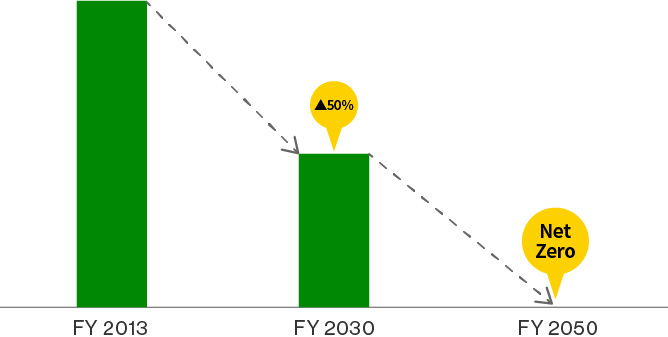
Efforts to realize a resource-recycling society
We are working toward the resource recycling targets of the JR East Group by FY 2030.
[ Group Goals ]
• Reduction of one-way plastic consumption and switching to renewable materials for one-way plastic containers and packaging
• Reduction of waste and improvement of recycling rate



